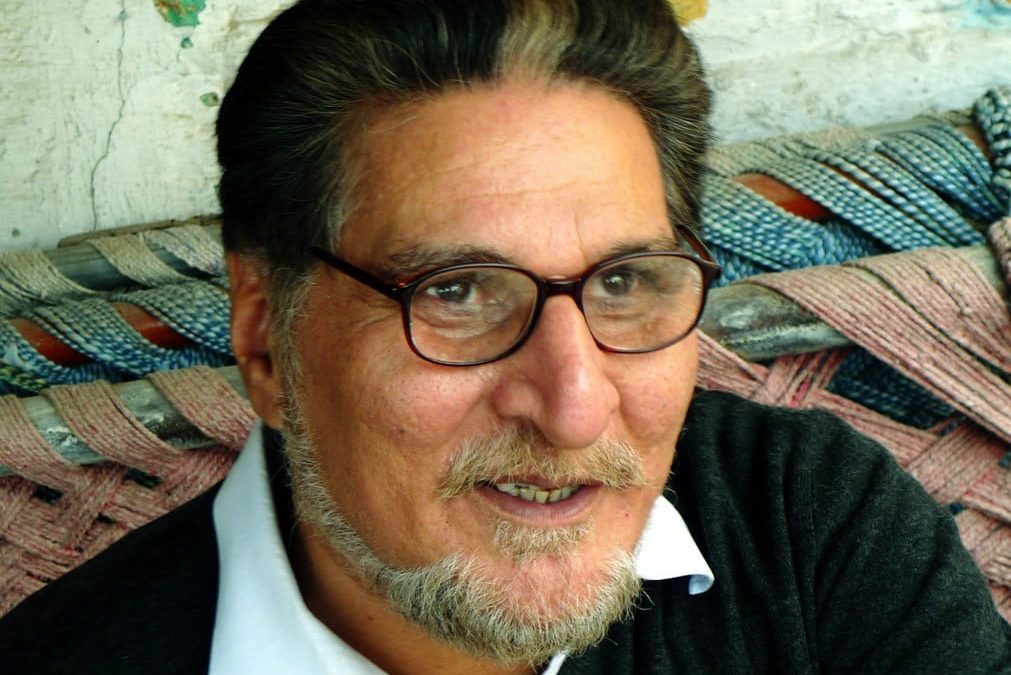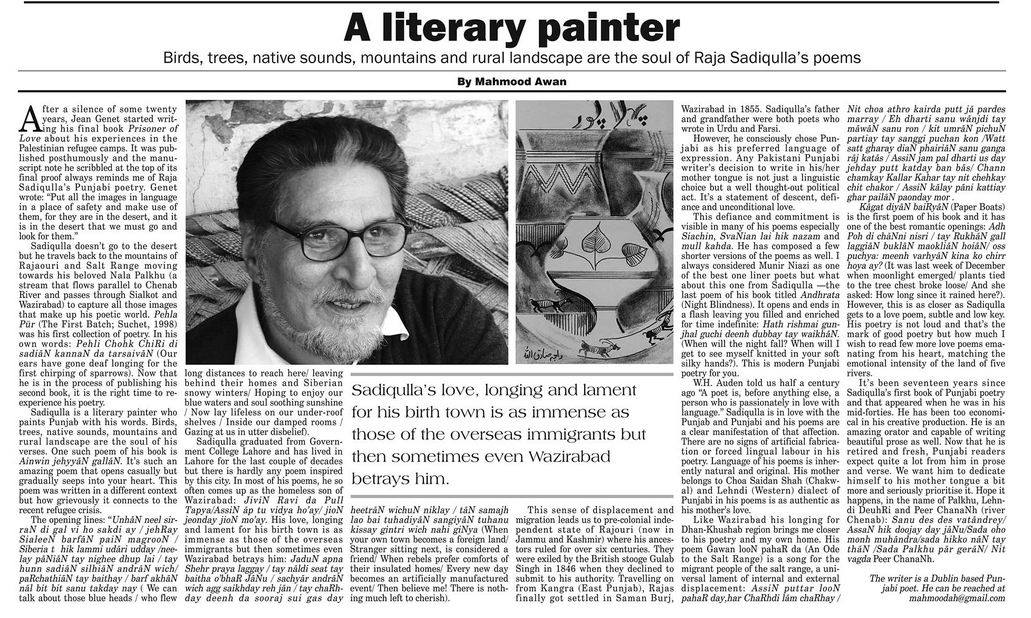Mahmood Awan (The News on Sunday, 11th October 2015)
After a silence of some twenty years, Jean Genet started writing his final book Prisoner of Love about his experiences in the Palestinian refugee camps. It was published posthumously and the manuscript note he scribbled at the top of its final proof always reminds me of Raja Sadiqulla’s Punjabi poetry. Genet wrote: “Put all the images in language in a place of safety and make use of them, for they are in the desert, and it is in the desert that we must go and look for them.”
Sadiqulla doesn’t go to the desert but he travels back to the mountains of Rajaouri and Salt Range moving towards his beloved Nala Palkhu (a stream that flows parallel to Chenab River and passes through Sialkot and Wazirabad) to capture all those images that make up his poetic world. Pehla Pür (The First Batch; Suchet, 1998) was his first collection of poetry. In his own words: Pehli Chohk ChiRi di sadiãN kannaN da tarsaivãN (Our ears have gone deaf longing for the first chirping of sparrows). Now that he is in the process of publishing his second book, it is the right time to re-experience his poetry.
Sadiqulla is a literary painter who paints Punjab with his words. Birds, trees, native sounds, mountains and rural landscape are the soul of his verses. One such poem of his book is Ainwin jehyyãN gallãN. It’s such an amazing poem that opens casually but gradually seeps into your heart. This poem was written in a different context but how grievously it connects to the recent refugee crisis.
The opening lines: “UnhãN neel sirraN di gal vi ho sakdi ay / jehRay SialeeN barfãN paiN magrooN / Siberia tǔ hik lammi udãri udday /neelay pãNiãN tay nighee dhup lai / tay hunn sadiãN silhiãN andrãN wich/ paRchathiãN tay baithay / barf akhãN nãl bit bit sanu takday nay ( We can talk about those blue heads / who flew long distances to reach here/ leaving behind their homes and Siberian snowy winters/ Hoping to enjoy our blue waters and soul soothing sunshine / Now lay lifeless on our under-roof shelves / Inside our damped rooms / Gazing at us in utter disbelief).
Sadiqulla graduated from Government College Lahore and has lived in Lahore for the last couple of decades but there is hardly any poem inspired by this city. In most of his poems, he so often comes up as the homeless son of Wazirabad: JiviN Ravi da Pull Tapya/AssiN ãp tu vidya ho’ay/ jioN jeonday jioN mo’ay. His love, longing and lament for his birth town is as immense as those of the overseas immigrants but then sometimes even Wazirabad betrays him: JaduN apna Shehr praya laggay / tay nãldi seat tay baitha o’bhaR JãNu / sachyãr andrãN wich agg saikhday reh jãn / tay chaRhday deenh da sooraj sui gas day heetrãN wichuN niklay / tãN samajh lao bai tuhadiyãN sangiyãN tuhanu kissay gintri wich nahi giNya (When your own town becomes a foreign land/ Stranger sitting next, is considered a friend/ When rebels prefer comforts of their insulated homes/ Every new day becomes an artificially manufactured event/ Then believe me! There is nothing much left to cherish).
This sense of displacement and migration leads us to pre-colonial independent state of Rajouri (now in Jammu and Kashmir) where his ancestors ruled for over six centuries. They were exiled by the British stooge Gulab Singh in 1846 when they declined to submit to his authority. Travelling on from Kangra (now part of Himachel Pardesh), Rajas finally got settled in Saman Burj, Wazirabad in 1855. Sadiqulla’s father and grandfather were both poets who wrote in Urdu and Farsi.
However, he consciously chose Punjabi as his preferred language of expression. Any Pakistani Punjabi writer’s decision to write in his/her mother tongue is not just a linguistic choice but a well thought-out political act. It’s a statement of descent, defiance and unconditional love.
This defiance and commitment is visible in many of his poems especially Siachin, SvaNian lai hik nazam and mull kahda. He has composed a few shorter versions of the poems as well. I always considered Munir Niazi as one of the best one liner poets but what about this one from Sadiqulla –the last poem of his book titled Andhrata (Night Blindness). It opens and ends in a flash leaving you filled and enriched for time indefinite: Hath rishmai gunjhal guchi deenh dubbay tay waikhãN. (When will the night fall? When will I get to see myself knitted in your soft silky hands?). This is modern Punjabi poetry for you.
W.H. Auden told us half a century ago “A poet is, before anything else, a person who is passionately in love with language.” Sadiqulla is in love with the Punjab and Punjabi and his poems are a clear manifestation of that affection. There are no signs of artificial fabrication or forced lingual labour in his poetry. Language of his poems is inherently natural and original. His mother belongs to Choa Saidan Shah (Chakwal) and Lehndi (Western) dialect of Punjabi in his poems is as authentic as his mother’s love.
Like Wazirabad his longing for Dhan-Khushab region brings me closer to his poetry and my own home. His poem Gawan looN pahaR da (An Ode to the Salt Range) is a song for the migrant people of the salt range, a universal lament of internal and external displacement: AssiN puttar looN pahaR day,har ChaRhdi lãm chaRhay / Nit choa athro kairda putt jã pardes marray / Eh dharti sanu wãnjdi tay mãwãN sanu ron / kit umrãN pichuN partiay tay sanggi puchan kon /Watt satt gharay diaN phairiãN sanu ganga rãj katãs / AssiN jam pal dharti us day jehday putt katday ban bãs/ Chann chamkay Kallar Kahar tay nit chehkay chit chakor / AssiN kãlay pãni kattiay ghar pailãN paonday mor .
Kãgat diyãN baiRyãN (Paper Boats) is the first poem of his book and it has one of the best romantic openings: Adh Poh di chãNni nisri / tay RukhãN gall laggiãN buklãN maokliãN hoiãN/ oss puchya: meenh varhyãN kina ko chirr hoya ay? (It was last week of December when moonlight emerged/ plants tied to the tree chest broke loose/ And she asked: How long since it rained here?). However, this is as closer as Sadiqulla gets to a love poem, subtle and low key. His poetry is not loud and that’s the mark of good poetry but how much I wish to read few more love poems emanating from his heart, matching the emotional intensity of the land of five rivers.
It’s been seventeen years since Sadiqulla’s first book of Punjabi poetry and that appeared when he was in his mid-forties. He has been too economical in his creative production. He is an amazing orator and capable of writing beautiful prose as well. Now that he is retired and fresh, Punjabi readers expect quite a lot from him in prose and verse. We want him to dedicate himself to his mother tongue a bit more and seriously prioritise it. Hope it happens, in the name of Palkhu, Lehndi DeuhRi and Peer ChanaNh (river Chenab): Sanu des des vatãndrey/ AssaN hik doojay day jãNu/Sada oho monh muhãndra/sada hikko nãN tay thãN /Sada Palkhu pãr gerãN/ Nit vagda Peer ChanaNh.
Published on 11th October 2015 in The News on Sunday.
https://www.thenews.com.pk/tns/detail/559551-raja-sadiqulla-a-literary-painter


